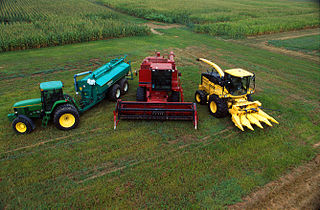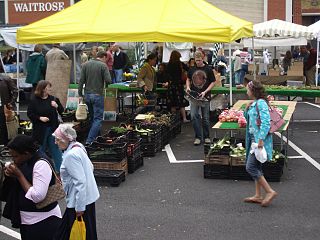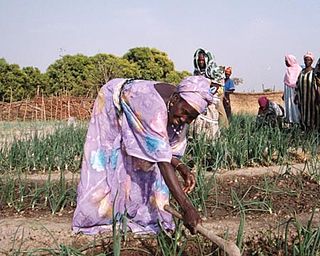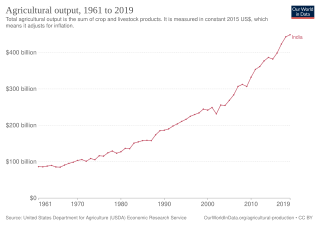
Agriculture encompasses crop and livestock production, aquaculture, fisheries, and forestry for food and non-food products. Agriculture was the key development in the rise of sedentary human civilization, whereby farming of domesticated species created food surpluses that enabled people to live in cities. While humans started gathering grains at least 105,000 years ago, nascent farmers only began planting them around 11,500 years ago. Sheep, goats, pigs, and cattle were domesticated around 10,000 years ago. Plants were independently cultivated in at least 11 regions of the world. In the 20th century, industrial agriculture based on large-scale monocultures came to dominate agricultural output.

The Food and Agriculture Organization of the United Nations (FAO) is a specialized agency of the United Nations that leads international efforts to defeat hunger and improve nutrition and food security. Its Latin motto, fiat panis, translates to "let there be bread". It was founded on 16 October 1945.

A farmer is a person engaged in agriculture, raising living organisms for food or raw materials. The term usually applies to people who do some combination of raising field crops, orchards, vineyards, poultry, or other livestock. A farmer might own the farmland or might work as a laborer on land owned by others. In most developed economies, a "farmer" is usually a farm owner (landowner), while employees of the farm are known as farm workers. However, in other older definitions a farmer was a person who promotes or improves the growth of plants, land, or crops or raises animals by labor and attention.

The United States Department of Agriculture (USDA) is an executive department of the United States federal government that aims to meet the needs of commercial farming and livestock food production, promotes agricultural trade and production, works to assure food safety, protects natural resources, fosters rural communities and works to end hunger in the United States and internationally. It is headed by the secretary of agriculture, who reports directly to the president of the United States and is a member of the president's Cabinet. The current secretary is Tom Vilsack, who has served since February 24, 2021.

Organic farming, also known as ecological farming or biological farming, is an agricultural system that uses fertilizers of organic origin such as compost manure, green manure, and bone meal and places emphasis on techniques such as crop rotation and companion planting. It originated early in the 20th century in reaction to rapidly changing farming practices. Certified organic agriculture accounts for 70 million hectares globally, with over half of that total in Australia. Biological pest control, mixed cropping, and the fostering of insect predators are encouraged. Organic standards are designed to allow the use of naturally-occurring substances while prohibiting or strictly limiting synthetic substances. For instance, naturally-occurring pesticides such as pyrethrin are permitted, while synthetic fertilizers and pesticides are generally prohibited. Synthetic substances that are allowed include, for example, copper sulfate, elemental sulfur, and veterinary drugs. Genetically modified organisms, nanomaterials, human sewage sludge, plant growth regulators, hormones, and antibiotic use in livestock husbandry are prohibited. Organic farming advocates claim advantages in sustainability, openness, self-sufficiency, autonomy and independence, health, food security, and food safety.
The International Treaty on Plant Genetic Resources for Food and Agriculture, is a comprehensive international agreement in harmony with the Convention on Biological Diversity, which aims at guaranteeing food security through the conservation, exchange and sustainable use of the world's plant genetic resources for food and agriculture (PGRFA), the fair and equitable benefit sharing arising from its use, as well as the recognition of farmers' rights. It was signed in 2001 in Madrid, and entered into force on 29 June 2004.

An agricultural subsidy is a government incentive paid to agribusinesses, agricultural organizations and farms to supplement their income, manage the supply of agricultural commodities, and influence the cost and supply of such commodities.

Local food is food that is produced within a short distance of where it is consumed, often accompanied by a social structure and supply chain different from the large-scale supermarket system.

Community-supported agriculture or cropsharing is a system that connects producers and consumers within the food system closer by allowing the consumer to subscribe to the harvest of a certain farm or group of farms. It is an alternative socioeconomic model of agriculture and food distribution that allows the producer and consumer to share the risks of farming. The model is a subcategory of civic agriculture that has an overarching goal of strengthening a sense of community through local markets.
Agribusiness is the industry, enterprises, and the field of study of value chains in agriculture and in the bio-economy, in which case it is also called bio-business or bio-enterprise. The primary goal of agribusiness is to maximize profit while satisfying the needs of consumers for products related to natural resources such as biotechnology, farms, food, forestry, fisheries, fuel, and fiber.

An agricultural cooperative, also known as a farmers' co-op, is a producer cooperative in which farmers pool their resources in certain areas of activity.

The history of agriculture in India dates back to the Neolithic period. India ranks second worldwide in farm outputs. As per the Indian economic survey 2020 -21, agriculture employed more than 50% of the Indian workforce and contributed 20.2% to the country's GDP.

E. Thurman Gaskill was an American politician who served as an Iowa State Senator from the 6th District and Assistant Majority Leader of the Iowa Senate. Gaskill was a grain farmer and a director of Meta Financial Group, Incorporated, a bank holding company. He served in the Iowa Senate 1997–2007. He also was a commissioner of both Iowa's Department of Economic Development and its Department of Natural Resources, president of Iowa Corn Growers Association, president of National Corn Growers Association, chairman of the United States Feed Grains Council, and held other agriculture positions.

Agriculture is the largest employment sector in Bangladesh, making up 14.2 percent of Bangladesh's GDP in 2017 and employing about 42.7 percent of the workforce. The performance of this sector has an overwhelming impact on major macroeconomic objectives like employment generation, poverty alleviation, human resources development, food security, and other economic and social forces. A plurality of Bangladeshis earn their living from agriculture. Due to a number of factors, Bangladesh's labour-intensive agriculture has achieved steady increases in food grain production despite the often unfavorable weather conditions. These include better flood control and irrigation, a generally more efficient use of fertilisers, as well as the establishment of better distribution and rural credit networks.

Agroecology is an applied science that involves the adaptation of ecological concepts to the structure, performance, and management of sustainable agroecosystems. In Latin America, agroecological practices have a long history and vary between regions but share three main approaches or levels: plot scale, farm scale, and food system scale. Agroecology in Latin American countries can be used as a tool for providing both ecological, economic, and social benefits to the communities that practice it, as well as maintaining high biodiversity and providing refuges for flora and fauna in these countries. Due to its broad scope and versatility, it is often referred to as "a science, a movement, a practice."

Agriculture in Saudi Arabia is focused on the export of dates, dairy products, eggs, fish, poultry, fruits, vegetables, and flowers to markets around the world after achieving self-sufficiency in the production of such products. The government of Saudi Arabia is heavily involved in the agriculture industry and subsidizing corporate farming and the Ministry of Environment, Water and Agriculture is primarily responsible for agricultural policy. In the private sector, farmers receive long-term interest-free government loans and low-cost water, fuel, electricity, and duty-free imports of raw materials and machinery.
Alliance for a Green Revolution in Africa (AGRA) is an organisation that seeks to transform African agriculture from a subsistence model to strong businesses that improve the livelihoods of the continent’s farming households.

Texas Farm Bureau, Texas's largest farm organization, represents the interests of agricultural producers and rural communities across Texas as the "Voice of Texas Agriculture." Texas Farm Bureau's grassroots structure begins in local communities across the state of Texas. The non-profit organization's direction and decision making are dictated by its members.

The minimum support price (MSP) is an advisory price signal that is part of a larger set of agricultural policies in parts of India. This informal "support" price is recommended by the government and aims to safeguard the farmer to a minimum profit for the harvest while at the same time increasing food security in the country. MSP was initially an incentive for farmers to adopt technology with an aim of increasing the productivity of agricultural land in the 1960s, however in the 2000s it is seen as a market intervention and farmer income scheme. The effectiveness of such a price policy has varied widely between states and commodities. Awareness among farmers of the existence of an MSP is poor at 23%, while awareness of MSP procurement agencies is also poor with only about 20–25% of wheat and paddy produce being sold at MSP.
A number of movements seek to expand the practice of agroecology in West Africa. Agroecology is a scientific discipline, movement and practice that integrates ecology in agriculture with strong emphasis on diversification, food sovereignty, energy efficiency and sustainability. Agroecological practices apply the systems and knowledge that traditional farmers in the region have developed and inherited. The agroecological social movement empowers smallholder farmers that hold the knowledge of indigenous farming systems, however are recently engulfed by larger farms or are migrating to urban areas, looking for better paying jobs.














